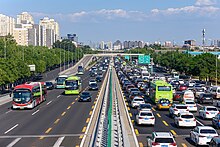
Back صناعة السيارات في الصين Arabic Автомобилна промишленост в КНР Bulgarian Geschichte der Automobilindustrie Chinas German صنعت خودروسازی چین Persian Kiinan autoteollisuus Finnish Industri otomotif di Tiongkok ID 中国の自動車産業 Japanese Indústria automotiva na China Portuguese Industria automobilelor în China Romanian Автомобильная промышленность КНР Russian

This article may require copy editing for grammar, style, cohesion, tone, or spelling. (May 2024) |
This article or section possibly contains synthesis of material which does not verifiably mention or relate to the main topic. (May 2024) |
| Part of a series on the |
| History of science and technology in China |
|---|
 |
The automotive industry in mainland China has been the largest in the world measured by automobile unit production since 2008. As of 2024[update], mainland China is also the world's largest automobile market both in terms of sales and ownership.
The Chinese automotive industry has seen significant developments and transformations over the years. While the period from 1949 to 1980 witnessed slow progress in the industry due to restricted competition and political instability during the Cultural Revolution, the landscape started to shift during the Chinese economic reform period, especially after the government's seventh five-year plan prioritized the domestic automobile manufacturing sector.
Foreign investment and joint ventures played a crucial role in attracting foreign technology and capital into China. American Motors Corporation (AMC) and Volkswagen were among the early entrants, signing long-term contracts to produce vehicles in China. This led to the gradual localization of automotive components, and the strengthening of key local players such as SAIC, FAW, Dongfeng and Changan, collectively known as the "Big Four".
The entry of China into the World Trade Organization (WTO) in 2001 further accelerated the growth of the automotive industry. Tariff reductions and increased competition led to a surge in car sales, with China becoming the largest auto producer globally in 2008.[1][2] Strategic initiatives and industrial policy such as Made in China 2025 specifically prioritized electric vehicle manufacturing.
In the 2020s, the automotive industry in mainland China has experienced a rise in market dominance by domestic manufacturers, with a growing focus on areas such as electric vehicle technology and advanced assisted driving systems. The domestic market size, technology and supply chains has also led foreign carmakers to seek further partnerships with Chinese manufacturers. In 2023, China overtook Japan and became the world largest car exporter.[3] However, the industry also faced heightened scrutiny, tariffs, and other restrictions, especially in the area of EVs due to allegations of Chinese industrial overcapacity and significant state subsidies.[4][5]
- ^ Marr, Kendra (2009-05-18). "China emerges as world's auto epicenter". NBC News. Archived from the original on 2024-05-16. Retrieved 2024-05-16.
- ^ "Motoring ahead". The Economist. October 23, 2009. ISSN 0013-0613. Archived from the original on 2024-05-26. Retrieved 2024-05-16.
- ^ Hoskins, Peter (18 May 2023). "China overtakes Japan as world's top car exporter". BBC News. Archived from the original on 14 November 2023. Retrieved 3 August 2023.
- ^ Cite error: The named reference
:262was invoked but never defined (see the help page). - ^ "EU companies warn China on EV overcapacity". Financial Times. Archived from the original on 2024-05-22. Retrieved 2024-05-22.
© MMXXIII Rich X Search. We shall prevail. All rights reserved. Rich X Search